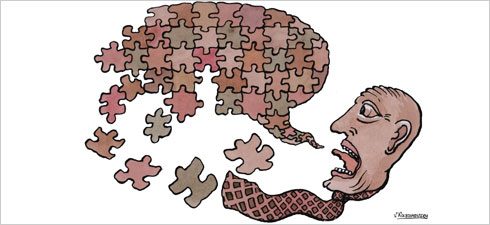“Your interests lie in Europe. It’s time that your sentiments did as well,” the Polish foreign minister told his British audience last Friday. That doesn’t sound like what we call diplomatic language, but Radislaw Sikorski is not a foreign minister from the old school. Sikorski didn’t mince his words in Oxford – support and take part in a stronger EU or risk isolation, he came to say – and neither did he mince them in November 2011 in Berlin.
You are not the innocent victim of others’ profligacy, he told his hosts. You repeatedly broke the Stability and Growth Pact, and your banks lent uncontrollably and bought high-risk bonds, then unloaded them onto the German citizenry. There in Berlin he also uttered a statement that, coming from a Polish minister, was nothing less than historical: “I fear German power less than I am beginning to fear German inactivity.” Unambiguous and straight to the point.
Sikorski is not your typical European foreign minister, but he’s not alone in his new style. Carl Bildt, the contentious foreign minister of Sweden, doesn’t bite his tongue or shy away from controversy either. Bildt’s remarks have caused serious discord, for example by comparing the Russian intervention in South Ossetia with the Nazi annexation of the Sudetenland, and declaring that ‘Israel is the danger’ (and not Iran).
Polish strategy is paradigmatic
Controversies aside, Sikorski and Bildt share their blunt and unambiguous style in the Foreign Affairs Council – the body that brings together foreign ministers from across the EU – with the young Finnish Minister, Alexander Stubb, who is a regular columnist, blogger and tweeter actively involved in national and European policy debates. Stubb, for example, going against the majority opinion in his country, defends Finland’s integration into NATO. Another diplomat with a similar style is the Bulgarian Nikolai Mladenov, who is particularly active in the Middle East.
Straight-speaking and relatively young, trained in English-speaking environments, with no diplomatic past, working together, dispensing with translations the better to communicate, these ministers will shape a new European foreign policy. Through incisive speeches and by working the social networks, by making alliances before meetings, cultivating intensive contacts with think tanks and opinion makers, and seeking the complicity of the common institutions with no fear of confronting them, the impact they are having on the EU’s foreign policy is greater than might be expected from the power of their states. At the same time, for that matter, they’re rolling everything along just where they want it to roll.
The Polish strategy is paradigmatic and not just because of the active role of the minister in challenging public opinion in other countries. In the context of its EU presidency in the second half of 2011, Warsaw boosted its support for Poland’s centres working in international relations and subsidised dozens of events across the EU, with the aim of setting Polish priorities at the centre of the discussions in Brussels and the national capitals.
A straightforward style
Poland is committing an important political analysis section to its ministry, which currently has five times more staff than Spain’s and is planning to double its size next year. Ideas, proposals and participation in a environment geared towards European thinking that transcends inter-governmental negotiations is becoming a key plank in Warsaw’s strategy.
The current crisis underscores the growing interdependence between EU Member States. Dealing with each other using the language and forms of traditional diplomacy and behaving in the EU as one would in any classic international negotiations can no longer be effective. The diplomatic language that prevails in Europe, the only thing that can stand up to the faits accomplis and direction by the big three (Germany, France and Britain) is not restricted to the inter-governmental circles of Brussels, the summits and the embassies.
It is a straightforward style that is not afraid of clashes of ideas, that no longer interprets diplomacy as an exchange of pre-defined interests in national capitals. European foreign policy is becoming an exercise in sharing analyses, shaping opinions, and shaping positions. It’s not enough to state one’s own position and proceed to negotiate it. The fundamental tasks of the foreign ministries today are to design and argue over ideas, before a public opinion that takes in all of Europe, with governments, media, analysts and citizens of other states, and collaborating with other diplomats as much with actors in society, the economy and the media. Those who have grasped this, starting with Poland, are at the heart of the new foreign policy of the EU.
Was this article useful? If so we are delighted!
It is freely available because we believe that the right to free and independent information is essential for democracy. But this right is not guaranteed forever, and independence comes at a cost. We need your support in order to continue publishing independent, multilingual news for all Europeans.
Discover our subscription offers and their exclusive benefits and become a member of our community now!












